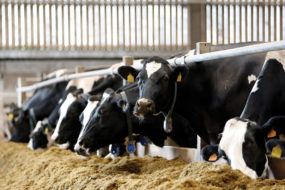Agricultural stakeholders are applauding a ruling made March 6 by the U.S. Securities and Exchange Commission (SEC).
The SEC adopted amendments to its rules under the Securities Act and Exchange Act that require public companies and public offerings to disclose certain climate-related information on their registration statements and annual reports. Within the final ruling, Scope 3 reporting of greenhouse gas (GHG) emissions are no longer required.
Such an amendment recognizes the livestock sector’s environmental stewardship.
“IDFA is pleased that the SEC responded to our comments and listened to our industry by removing Scope 3 emissions from its final climate disclosure rules,” states Michael Dykes, International Dairy Foods Association president and CEO, in a press release. “Since introducing the rule, the SEC has learned U.S. dairy has committed significant resources to achieve ambitious environmental stewardship goals […] resulting in a glass of milk with the smallest carbon-intensity footprint in the world.”
The EPA defines Scope 3 emissions as the result of activities from assets not owned or controlled by the reporting organization, but that the organization indirectly affects in its value chain.
Scope 3 emissions – often referred to as supply chain emissions – encompass GHG emissions across an entire product life cycle, from primary production to consumption and disposal. These emissions have been proven hard to abate due to the size and scale of global supply chains, lack of data to track upstream emissions of a product and the absence of reporting standards.
Read: Beyond the barn: Dairy farmers’ role in driving bottom-up change in supply chain emissions
Under the final ruling, companies no longer need to report GHG emissions from the dairy farms in which the milk is sourced to make the end product. Scope 1 (direct) and Scope 2 (energy and electricity) emissions reports are still required.
In March 2022, the SEC proposed an amendment that would require companies to report all sources of GHG emissions. The commission received more than 24,000 comment letters responding to the proposal, with the American Farm Bureau Federation (AFBF) leading the charge from the agricultural sector to remove Scope 3 reporting requirements.
One of the gravest concerns was farms’ lack of resources to hire consultants for calculating emissions, as well as producers’ data privacy.
“Farmers are committed to protecting the natural resources they’ve been entrusted with, and they continue to advance climate-smart agriculture, but they cannot afford to hire compliance officers just to handle SEC reporting requirements. This is especially true for small farms that would have likely been squeezed out of the supply chain,” says AFBF President Zippy Duvall in a press release addressing the SEC’s final ruling.
The final rule will go into effect 60 days following publication of the adopting release in the Federal Register. Compliance dates will be phased in for all registrants.
California’s climate disclosure rule
The California Climate Accountability Act signed into law in late 2023 is a first-of-its-kind mandatory climate emissions disclosure rule that is far more stringent that SEC’s final ruling.
By 2026, companies in the state and those selling into the state must report GHG emissions, including Scope 3. This pertains to both public and private companies that meet an annual $1 billion revenue threshold.
The state law is being challenged by the AFBF, U.S. Chamber of Commerce and others.










